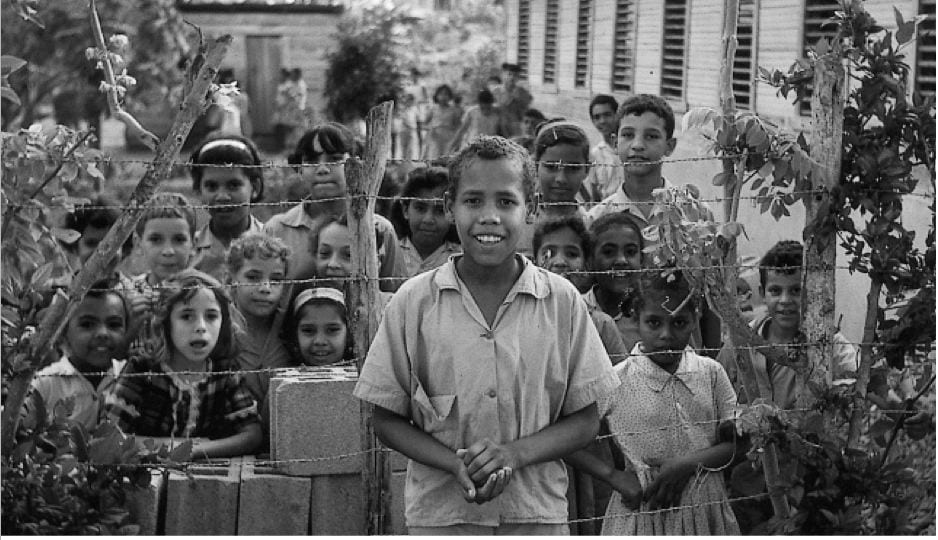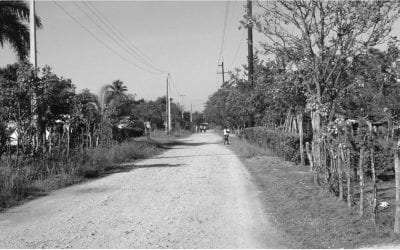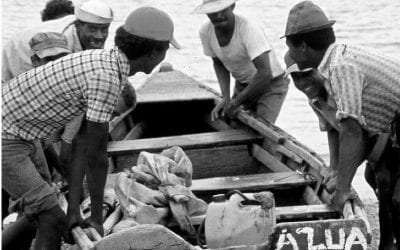Under the Bridge
And Down from the Hills

For the first time in her life, Merilee Grindle encountered deep and chronic poverty, as well as the realities of poor education and health care. Here is a scene from her volunteer experience. Photo by Merilee Grindle
I remember clearly the thirty seconds when I grew up. As we crossed the bridge over the river on the way from the airport, I looked down onto a multitude of shacks climbing crazily up the steep slopes of the sludgy riverbank. An awful truth was suddenly clear: in two years’ time, when I made the reverse trip on my way to the airport and home, I would look down on those same shacks climbing up the riverbank. Nothing I would do in the intervening years would have any real impact on the reality that was the Dominican Republic.
All those many years ago I had just graduated from Wellesley College, an idealist and a gringa who wanted to do good by joining the Peace Corps. In that brief journey across the river, I grew up in the ways of the world. For the first time in my life, I encountered deep and chronic poverty; I came face to face with inequity and powerlessness; I saw the realities of poor education and worse health care; I discovered the meaning of marginality; I understood the legacy of colonialism.
A second growing-up moment haunts me from those years. A mother walked down from the hills, where she lived in a remote village with her two young daughters. She asked me to take their picture; she knew her children were going to die soon and wanted something to remember them by. I thought she was probably right; the girls were stick-thin, wan, and listless. The snapshot remains crystal clear in my mind.
I lived first in a small city and then in a village, and I found the lack of running water, electricity, and privacy relatively easy. Much more difficult was coming to terms with the gap that separated my comfortable life at home from the lives of those born into poverty in a poor country. I found that my education had not prepared me for acting effectively in the world and that I was not very good even at those few activities I did undertake. Nor could my assignment in mother-child health in any way compensate for the damage done by poverty and powerlessness. More profoundly, I was confronted with the history of the relationship between my country and this one. I was, after all, a volunteer in a country that had, two years earlier, witnessed the invasion of 42,000 U.S. Marines. One of its 19th century presidents tried to annex the country to the United States. Marines occupied it between 1916 and 1924. At 2 a.m. one morning, a drunken man in the house next door ranted that that he had a gun and he was going to shoot the gringos.
Of course, there are other memories—a countryside blessed with vibrant green beauty, kind and generous people, times when differences melded into shared enjoyment of a moment. There were the experiences of living on rice, yucca, beans, andplátanos; dancing the merengue; hearing Mass across the barrio at 5 o’clock every morning on multiple radios turned up loud; collecting tales of sánganos jumping out onto dark, lonely rural roads, ready to suck a victim’s blood. And there was what we shared as volunteers—common anxieties, trials, tribulations, small victories, and escapes to the big city for weekends of beer and Chinese food.
It was not an easy two years, but they were important ones: years when I was forced to abandon belief in facile solutions and the ease with which good could be accomplished. Poverty, I discovered, was structural, it was pervasive, and it was deeply bound up with inequalities in power and access to basic rights. The poverty of people and countries, I saw, could not be divorced from the relations among countries, particularly poor with rich ones.
Eventually, these issues drove me to graduate school. Yet today, I continue to see the view from the bridge and remember the mother who came down from the hills with her two sickly children. I haven’t yet discovered solutions to the conundrums they raised for me. Yet I do believe it important that we know more about how they happened and that we pass along our concerns to others who, we hope, will be better prepared to make a difference than I was when I was 22.
Winter 2009, Volume VIII, Number 2
Related Articles
Editor’s Letter: The Sixties
When I first started working on this ReVista issue on Colombia, I thought of dedicating it to the memory of someone who had died. Murdered newspaper editor Guillermo Cano had been my entrée into Colombia when I won an Inter American Press Association fellowship in 1977. Others—journalist Penny Lernoux and photographer Richard Cross—had also committed much of their lives to Colombia, although their untimely deaths were …
The True Impact of the Peace Corps: Returning from the Dominican Republic ’03-’05
I am an RPCV: a Returned Peace Corps Volunteer. For me the Peace Corps was an intense life experience, above anything else. As I continue to reflect on it, I am struck with the many and varied ways in which it continues to affect my life. As a PCV in the Dominican Republic from September 2003 to November 2005, I lived, worked, and learned in a small sugar cane-dependent community two hours outside of Santo Domingo…
In the Shadow of JFK: One Peace Corps Experience
I am often asked about the Peace Corps by students and recent graduates. The most frequent questions are, “why join?”, “what did you do?”, and “what has it meant for your career?” Here is my story. My earliest recollection of international curiosity was in the fourth grade when Sister Margaret Thomas described her experience as a recently returned missionary in Bangladesh. In high school, my sister Mary went to Peru on …



